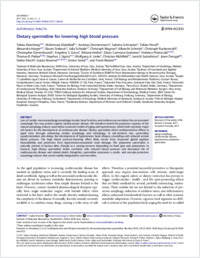Dietary spermidine for lowering high blood pressure
- Eisenberg, Tobias Institute of Molecular Biosciences, NAWI Graz, University of Graz, Austria - BioTechMed Graz, Austria
- Abdellatif, Mahmoud Department of Cardiology, Medical University of Graz, Austria
- Zimmermann, Andreas Institute of Molecular Biosciences, NAWI Graz, University of Graz, Austria
- Schroeder, Sabrina Institute of Molecular Biosciences, NAWI Graz, University of Graz, Austria
- Pendl, Tobias Institute of Molecular Biosciences, NAWI Graz, University of Graz, Austria
- Harger, Alexandra Institute of Molecular Biosciences, NAWI Graz, University of Graz, Austria - Department of Internal Medicine, Medical University of Graz, Austria
- Stekovic, Slaven Institute of Molecular Biosciences, NAWI Graz, University of Graz, Austria
- Schipke, Julia Institute of Functional and Applied Anatomy, Hannover Medical School, Germany - Cluster of Excellence REBIRTH, Hannover, Germany
- Magnes, Christoph Joanneum Research Forschungsgesellschaft m.b.H., HEALTH, Graz, Austria
- Schmidt, Albrecht Department of Cardiology, Medical University of Graz, Austria
- Ruckenstuhl, Christoph Institute of Molecular Biosciences, NAWI Graz, University of Graz, Austria
- Dammbrueck, Christopher Institute of Molecular Biosciences, NAWI Graz, University of Graz, Austria
- Gross, Angelina S. Institute of Molecular Biosciences, NAWI Graz, University of Graz, Austria
- Herbst, Viktoria Department of Cardiology, Medical University of Graz, Austria
- Carmona-Gutierrez, Didac Institute of Molecular Biosciences, NAWI Graz, University of Graz, Austria
- Pietrocola, Federico Equipe 11 Labellis et Ligue Contre le Cancer, Centre de Recherche des Cordeliers, Paris, France - Cell Biology and Metabolomics Platforms, Gustave Roussy Comprehensive Cancer Center, Villejuif, France - INSERM, U1138, Paris, France - Université Paris Descartes, Sorbonne Paris Cité, France – Université Pierre et Marie Curie, Paris, France
- Pieber, Thomas R. BioTechMed Graz, Austria - Department of Internal Medicine, Medical University of Graz, Austria - Joanneum Research Forschungsgesellschaft m.b.H., HEALTH, Graz, Austria
- Sigrist, Stephan J. Institute for Biology, Freie Universität Berlin, Germany - NeuroCure, Charité, Berlin, Germany
- Linke, Wolfgang A. Department of Cardiovascular Physiology, Ruhr University Bochum, Germany
- Mühlfeld, Christian Institute of Functional and Applied Anatomy, Hannover Medical School, Germany - Cluster of Excellence REBIRTH, Hannover, Germany
- Sadoshima, Junichi Department of Cell Biology and Molecular Medicine, Rutgers–New Jersey Medical School, Newark, NJ, USA
- Dengjel, Jörn FRIAS Freiburg Institute for Advanced Studies, Department of Dermatology, Medical Center, University of Freiburg, Germany - Department of Biology, University of Fribourg, Switzerland
- Kiechl, Stefan Department of Neurology, Medical University of Innsbruck, Austria
- Kroemer, Guido Equipe 11 Labellis et Ligue Contre le Cancer, Centre de Recherche des Cordeliers, Paris, France - Cell Biology and Metabolomics Platforms, Gustave Roussy Comprehensive Cancer Center, Villejuif, France - INSERM, U1138, Paris, France - Université Paris Descartes, Sorbonne Paris Cité, France - Universit Pierre et Marie Curie, Paris, France - Pôle de Biologie, Hôpital Européen Georges Pompidou, Paris, France - Karolinska Institute, Department of Women’s and Children’s Health, Karolinska University Hospital, Stockholm, Sweden
- Sedej, Simon BioTechMed Graz, Austria - Department of Cardiology, Medical University of Graz, Austria
- Madeo, Frank Institute of Molecular Biosciences, NAWI Graz, University of Graz, Austria
-
24.01.2017
Published in:
- Autophagy. - 2017, vol. 13, no. 4, p. 767-769
English
Loss of cardiac macroautophagy/autophagy impairs heart function, and evidence accumulates that an increased autophagic flux may protect against cardiovascular disease. We therefore tested the protective capacity of the natural autophagy inducer spermidine in animal models of aging and hypertension, which both represent major risk factors for the development of cardiovascular disease. Dietary spermidine elicits cardioprotective effects in aged mice through enhancing cardiac autophagy and mitophagy. In salt-sensitive rats, spermidine supplementation also delays the development of hypertensive heart disease, coinciding with reduced arterial blood pressure. The high blood pressure-lowering effect likely results from improved global arginine bioavailability and protection from hypertension-associated renal damage. The polyamine spermidine is naturally present in human diets, though to a varying amount depending on food type and preparation. In humans, high dietary spermidine intake correlates with reduced blood pressure and decreased risk of cardiovascular disease and related death. Altogether, spermidine represents a cardio- and vascular- protective autophagy inducer that can be readily integrated in common diets.
- Faculty
- Faculté des sciences et de médecine
- Department
- Département de Biologie
- Language
-
- English
- Classification
- Biological sciences
- License
-
License undefined
- Identifiers
-
- RERO DOC 279076
- DOI 10.1080/15548627.2017.1280225
- Persistent URL
- https://folia.unifr.ch/unifr/documents/305249
Statistics
Document views: 136
File downloads:
- pdf: 261
